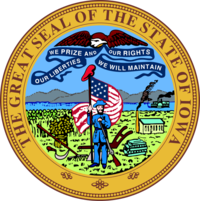Ballot access requirements for political parties in Iowa
|
|
| Ballot access for major and minor party candidates |
|---|
| Ballot access for presidential candidates |
| Select a state below to learn more about ballot access requirements for candidates in that state. |
|
|
| Ballot access requirements for political parties in the United States |
| List of political parties in the United States |
| Ballotpedia's Election Administration Legislation Tracker |
Note: This article is not intended to serve as a guide to running for public office. Individuals should contact their state election agencies for further information.
|
Although there are hundreds of political parties in the United States, only certain parties qualify to have the names of their candidates for office printed on election ballots. In order to qualify for ballot placement, a party must meet certain requirements that vary from state to state. For example, in some states, a party may have to file a petition in order to qualify for ballot placement. In other states, a party must organize around a candidate for a specific office; that candidate must, in turn, win a percentage of the vote in order for the party to be granted ballot status. In still other states, an aspiring political party must register a certain number of voters.
To learn more about ballot access requirements for political candidates in Iowa, click here.
Process for a political party to obtain ballot status
![]() See statutes: Section 43, Title II of the Iowa Code
See statutes: Section 43, Title II of the Iowa Code
Definitions
According to Iowa law, a political party is "a party which, at the last preceding general election, cast for its candidate for president of the United States or for governor, as the case may be, at least two percent of the total vote cast for all candidates for that office at that election."[1]
A non-party political organization (NPPO) is any political organization that does not meet the requirements to become a political party. NPPOs are not required to file paperwork for state recognition. Each NPPO may nominate a single candidate per partisan office.[2]
Ballot access
Only political parties may have candidates placed on the primary ballot. NPPO candidates must file nomination papers in order to be placed on the general election ballot. Nomination papers for an NPPO candidate include an affidavit of candidacy and either nomination petitions or a certificate from an NPPO convention.[2]
For an NPPO to become a political party, it must do the following:[2]
- Place a candidate for president or governor on the general election ballot.
- That candidate must then receive at least 2% of the votes cast for that office.
- Once the first two conditions are met, the NPPO must file an application for political party status with the Iowa Secretary of State. This must be done after the state's canvass of votes but within one year of the general election date.
The new political party's candidate for president or governor must continue to receive at least 2% of the vote at the general election in order for the party to maintain qualified status. If a candidate does not receive enough votes, the party's status will be revoked, and the process will have to be repeated.[2]
Political parties
As of May 2024, Iowa officially recognized three political parties. These are listed in the table below. In order to be recognized by the state, a party's candidate for president or governor must receive at least 2 percent of the total votes cast for those offices in the general election.[3]
| Party | Website link | By-laws/platform link |
|---|---|---|
| Democratic Party of Iowa | Link | Party platform |
| Republican Party of Iowa | Link | Party platform |
| Libertarian Party of Iowa | Link | Party platform |
Explore election legislation with Ballotpedia
- Try Ballotpedia's Election Administration Legislation TrackerBallotpedia's Election Administration Legislation Tracker provides daily updates on legislative activity related to election policy in all 50 states.
Our election policy experts translate complex bill text into easy-to-understand summaries. And because it's from Ballotpedia, our legislation tracker is guaranteed to be neutral, unbiased, and nonpartisan. - Read Ballotpedia's State of Election Administration Legislation ReportsBallotpedia publishes regular analysis of election administration legislation, including three full reports per year, providing ongoing coverage of legislative activity affecting election policy in each state.
These reports deliver insights into partisan priorities, dive deep into notable trends, and highlight activity in key states.
Subscribe to The Ballot BulletinThe Ballot Bulletin is a weekly email that delivers the latest updates on election policy.
The newsletter tracks developments in election policy around the country, including legislative activity, big-picture trends, and recent news. Each email contains in-depth data from our Election Administration Legislation Tracker.
See also
- Ballot access requirements for political candidates in Iowa
- Ballot access requirements for presidential candidates in Iowa
- List of political parties in the United States
- Democratic Party of Iowa
- Republican Party of Iowa
- Libertarian Party of Iowa
External links
Footnotes
 |
State of Iowa Des Moines (capital) |
|---|---|
| Elections |
What's on my ballot? | Elections in 2026 | How to vote | How to run for office | Ballot measures |
| Government |
Who represents me? | U.S. President | U.S. Congress | Federal courts | State executives | State legislature | State and local courts | Counties | Cities | School districts | Public policy |






